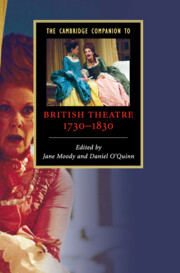6 - Tragedy
from Part II - Genres
Published online by Cambridge University Press: 28 May 2009
Summary
The English relation to tragedy during the long eighteenth century was paradoxical. On the one hand, literary people continued to venerate tragedy as a high art form which required poetical gifts and profound thought and which had a special capacity to affect audiences and readers deeply. About one hundred new tragedies premiered in London during the second half of the eighteenth century and still more tragedies were published than performed. Tragedy was an important subject in the period's literary scholarship, theory and criticism. With particular intensity, theorists and critics debated the relative merits of the neoclassical tragedies of Racine and Corneille versus those of indigenous Elizabethan tragedians, especially Shakespeare. The pioneering work of editors and critics such as Lewis Theobald and Samuel Johnson also contributed to a revival of Shakespeare's tragedies in performance. The reputations of famous actors were significantly based on their successes in tragic roles from Shakespeare and from Restoration tragedies by Thomas Otway and Nicholas Rowe. Contemporaries were absorbed in acting and in the psychology and physiology of the passions. By mid-century, a growing print record included magazine drama reviews, engravings of scenes and pamphlet controversies over the relative merits of different actors. These left us with unusually detailed descriptions such as this one about Garrick's performance as Lear cursing Goneril:
You fall precipitately upon your Knees, extend your arms - clench your Hand - set your Teeth - and with a savage Distraction in your Look - trembling in your Limbs - and your Eyes pointed to Heaven . . . begin . . . with a broken, inward, eager Utterance; from thence rising every Line in Loudness and Rapidity of Voice.
- Type
- Chapter
- Information
- The Cambridge Companion to British Theatre, 1730–1830 , pp. 87 - 102Publisher: Cambridge University PressPrint publication year: 2007
- 5
- Cited by



